Financial Crisis and Insolvency Analysis: The Case of ABC Learning
VerifiedAdded on 2023/06/10
|9
|2174
|327
Report
AI Summary
This report provides a comprehensive analysis of the financial crisis and subsequent insolvency of ABC Learning, a prominent Australian childcare provider. The report delves into the company's history, highlighting its rapid growth and expansion through acquisitions. It examines the internal factors that contributed to its downfall, including accounting manipulation, lack of transparency in operations, ineffective strategic planning, and corporate governance failures. The report details specific instances of fraudulent accounting practices, related-party transactions, and the impact of over-leveraging and unorganized expansion. It also discusses the negative consequences of the company's collapse, such as job losses and economic impact. Finally, the report identifies key lessons learned from the ABC Learning case, emphasizing the importance of transparent revenue management, focusing on core business activities, and establishing effective corporate governance policies to prevent similar corporate failures. The report provides valuable insights into the complexities of financial management and corporate governance.
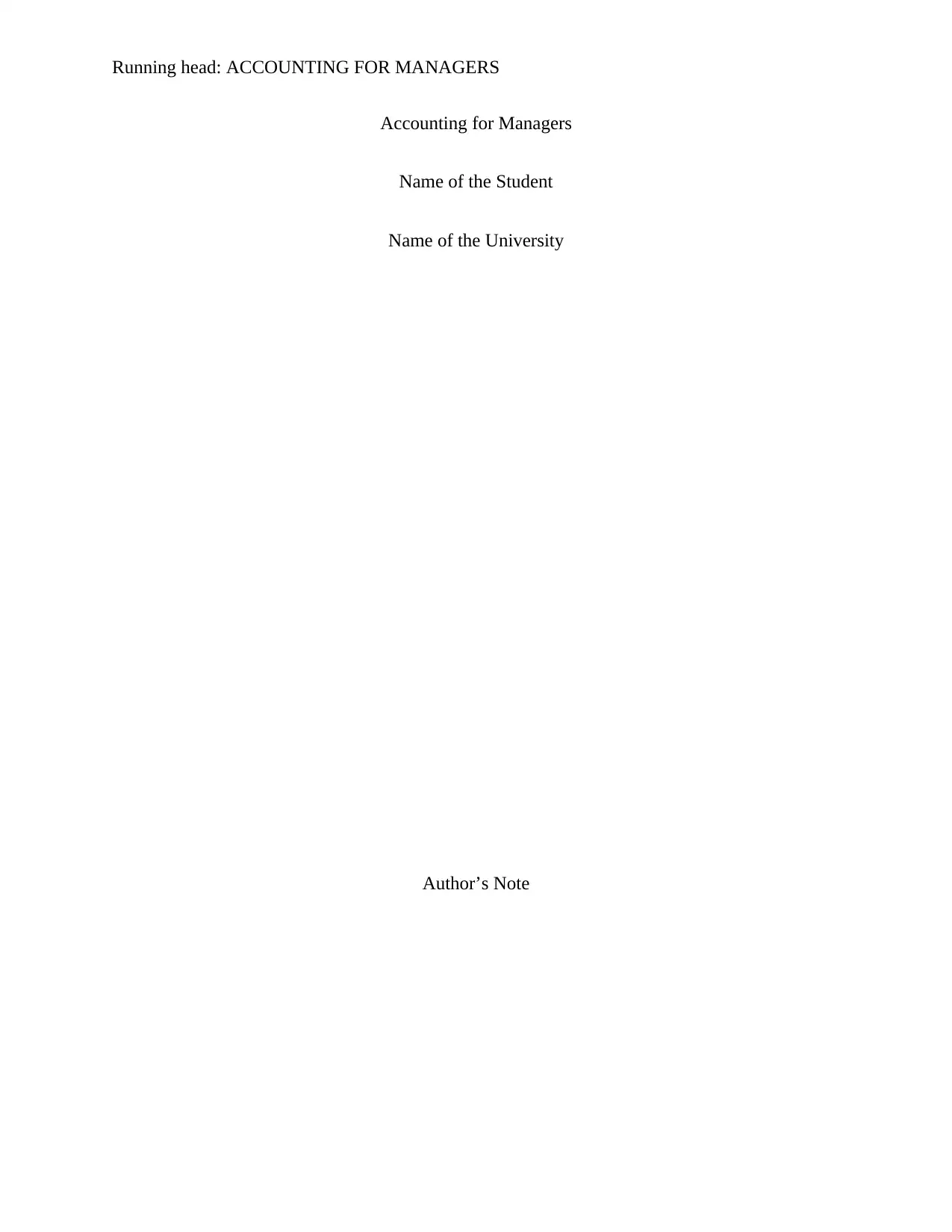
Running head: ACCOUNTING FOR MANAGERS
Accounting for Managers
Name of the Student
Name of the University
Author’s Note
Accounting for Managers
Name of the Student
Name of the University
Author’s Note
Paraphrase This Document
Need a fresh take? Get an instant paraphrase of this document with our AI Paraphraser
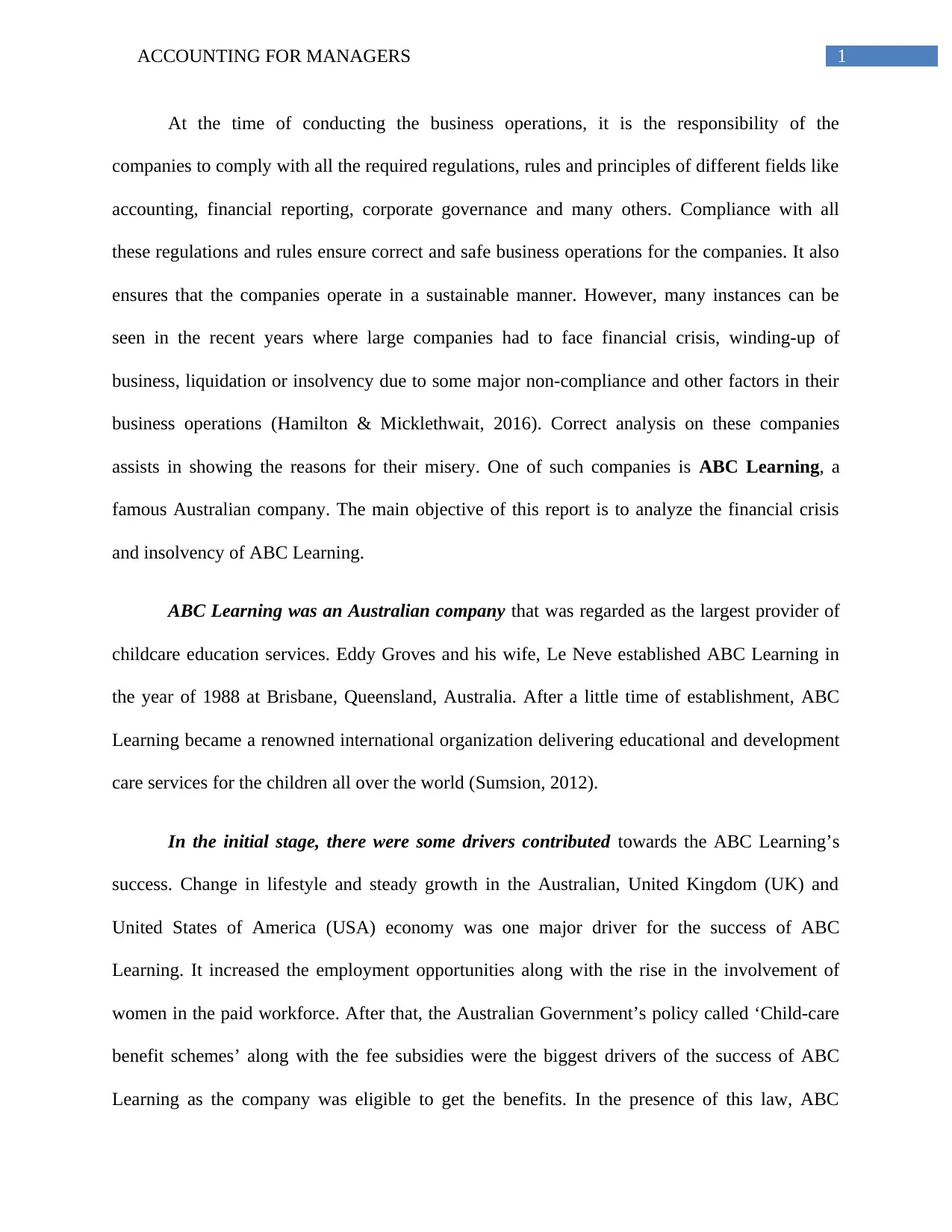
1ACCOUNTING FOR MANAGERS
At the time of conducting the business operations, it is the responsibility of the
companies to comply with all the required regulations, rules and principles of different fields like
accounting, financial reporting, corporate governance and many others. Compliance with all
these regulations and rules ensure correct and safe business operations for the companies. It also
ensures that the companies operate in a sustainable manner. However, many instances can be
seen in the recent years where large companies had to face financial crisis, winding-up of
business, liquidation or insolvency due to some major non-compliance and other factors in their
business operations (Hamilton & Micklethwait, 2016). Correct analysis on these companies
assists in showing the reasons for their misery. One of such companies is ABC Learning, a
famous Australian company. The main objective of this report is to analyze the financial crisis
and insolvency of ABC Learning.
ABC Learning was an Australian company that was regarded as the largest provider of
childcare education services. Eddy Groves and his wife, Le Neve established ABC Learning in
the year of 1988 at Brisbane, Queensland, Australia. After a little time of establishment, ABC
Learning became a renowned international organization delivering educational and development
care services for the children all over the world (Sumsion, 2012).
In the initial stage, there were some drivers contributed towards the ABC Learning’s
success. Change in lifestyle and steady growth in the Australian, United Kingdom (UK) and
United States of America (USA) economy was one major driver for the success of ABC
Learning. It increased the employment opportunities along with the rise in the involvement of
women in the paid workforce. After that, the Australian Government’s policy called ‘Child-care
benefit schemes’ along with the fee subsidies were the biggest drivers of the success of ABC
Learning as the company was eligible to get the benefits. In the presence of this law, ABC
At the time of conducting the business operations, it is the responsibility of the
companies to comply with all the required regulations, rules and principles of different fields like
accounting, financial reporting, corporate governance and many others. Compliance with all
these regulations and rules ensure correct and safe business operations for the companies. It also
ensures that the companies operate in a sustainable manner. However, many instances can be
seen in the recent years where large companies had to face financial crisis, winding-up of
business, liquidation or insolvency due to some major non-compliance and other factors in their
business operations (Hamilton & Micklethwait, 2016). Correct analysis on these companies
assists in showing the reasons for their misery. One of such companies is ABC Learning, a
famous Australian company. The main objective of this report is to analyze the financial crisis
and insolvency of ABC Learning.
ABC Learning was an Australian company that was regarded as the largest provider of
childcare education services. Eddy Groves and his wife, Le Neve established ABC Learning in
the year of 1988 at Brisbane, Queensland, Australia. After a little time of establishment, ABC
Learning became a renowned international organization delivering educational and development
care services for the children all over the world (Sumsion, 2012).
In the initial stage, there were some drivers contributed towards the ABC Learning’s
success. Change in lifestyle and steady growth in the Australian, United Kingdom (UK) and
United States of America (USA) economy was one major driver for the success of ABC
Learning. It increased the employment opportunities along with the rise in the involvement of
women in the paid workforce. After that, the Australian Government’s policy called ‘Child-care
benefit schemes’ along with the fee subsidies were the biggest drivers of the success of ABC
Learning as the company was eligible to get the benefits. In the presence of this law, ABC
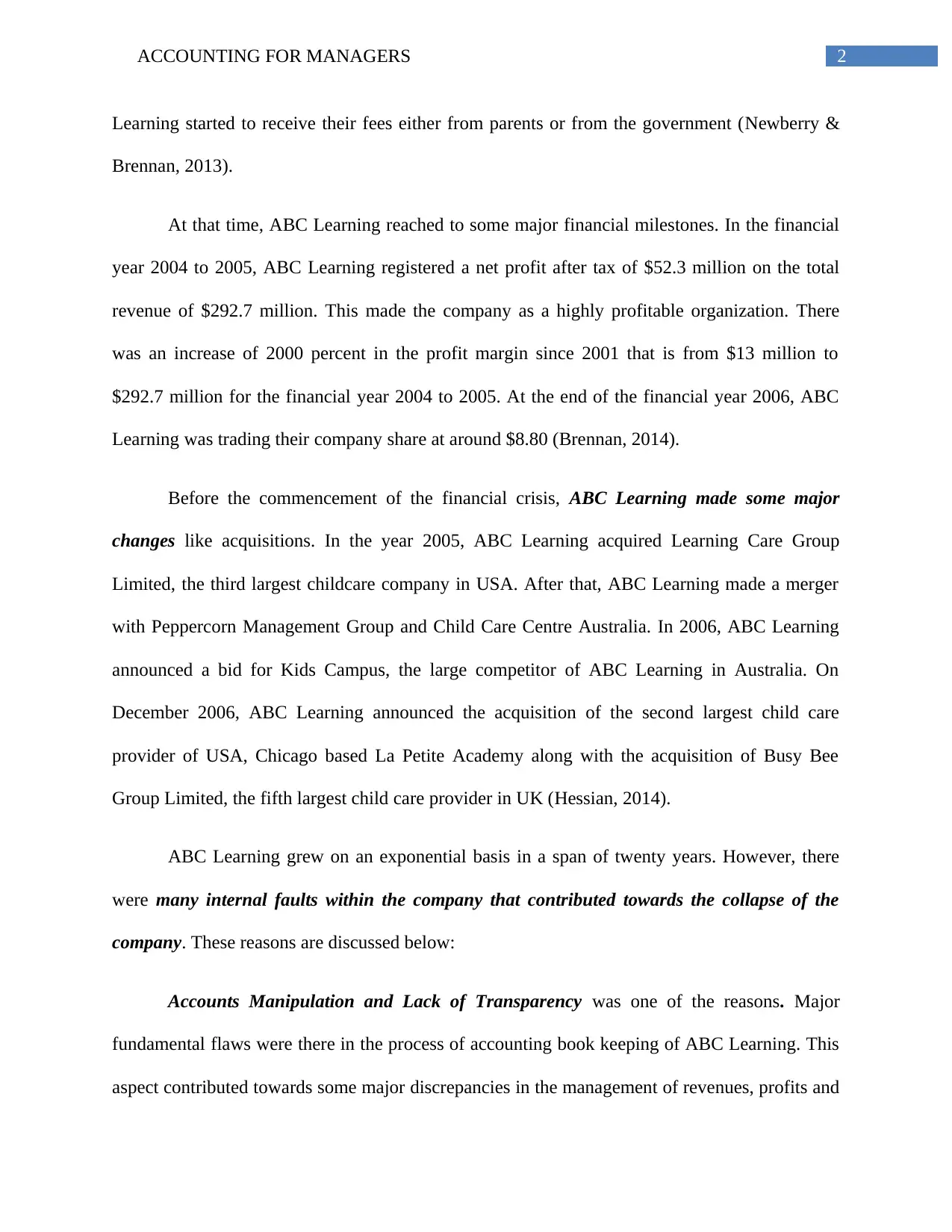
2ACCOUNTING FOR MANAGERS
Learning started to receive their fees either from parents or from the government (Newberry &
Brennan, 2013).
At that time, ABC Learning reached to some major financial milestones. In the financial
year 2004 to 2005, ABC Learning registered a net profit after tax of $52.3 million on the total
revenue of $292.7 million. This made the company as a highly profitable organization. There
was an increase of 2000 percent in the profit margin since 2001 that is from $13 million to
$292.7 million for the financial year 2004 to 2005. At the end of the financial year 2006, ABC
Learning was trading their company share at around $8.80 (Brennan, 2014).
Before the commencement of the financial crisis, ABC Learning made some major
changes like acquisitions. In the year 2005, ABC Learning acquired Learning Care Group
Limited, the third largest childcare company in USA. After that, ABC Learning made a merger
with Peppercorn Management Group and Child Care Centre Australia. In 2006, ABC Learning
announced a bid for Kids Campus, the large competitor of ABC Learning in Australia. On
December 2006, ABC Learning announced the acquisition of the second largest child care
provider of USA, Chicago based La Petite Academy along with the acquisition of Busy Bee
Group Limited, the fifth largest child care provider in UK (Hessian, 2014).
ABC Learning grew on an exponential basis in a span of twenty years. However, there
were many internal faults within the company that contributed towards the collapse of the
company. These reasons are discussed below:
Accounts Manipulation and Lack of Transparency was one of the reasons. Major
fundamental flaws were there in the process of accounting book keeping of ABC Learning. This
aspect contributed towards some major discrepancies in the management of revenues, profits and
Learning started to receive their fees either from parents or from the government (Newberry &
Brennan, 2013).
At that time, ABC Learning reached to some major financial milestones. In the financial
year 2004 to 2005, ABC Learning registered a net profit after tax of $52.3 million on the total
revenue of $292.7 million. This made the company as a highly profitable organization. There
was an increase of 2000 percent in the profit margin since 2001 that is from $13 million to
$292.7 million for the financial year 2004 to 2005. At the end of the financial year 2006, ABC
Learning was trading their company share at around $8.80 (Brennan, 2014).
Before the commencement of the financial crisis, ABC Learning made some major
changes like acquisitions. In the year 2005, ABC Learning acquired Learning Care Group
Limited, the third largest childcare company in USA. After that, ABC Learning made a merger
with Peppercorn Management Group and Child Care Centre Australia. In 2006, ABC Learning
announced a bid for Kids Campus, the large competitor of ABC Learning in Australia. On
December 2006, ABC Learning announced the acquisition of the second largest child care
provider of USA, Chicago based La Petite Academy along with the acquisition of Busy Bee
Group Limited, the fifth largest child care provider in UK (Hessian, 2014).
ABC Learning grew on an exponential basis in a span of twenty years. However, there
were many internal faults within the company that contributed towards the collapse of the
company. These reasons are discussed below:
Accounts Manipulation and Lack of Transparency was one of the reasons. Major
fundamental flaws were there in the process of accounting book keeping of ABC Learning. This
aspect contributed towards some major discrepancies in the management of revenues, profits and
⊘ This is a preview!⊘
Do you want full access?
Subscribe today to unlock all pages.

Trusted by 1+ million students worldwide
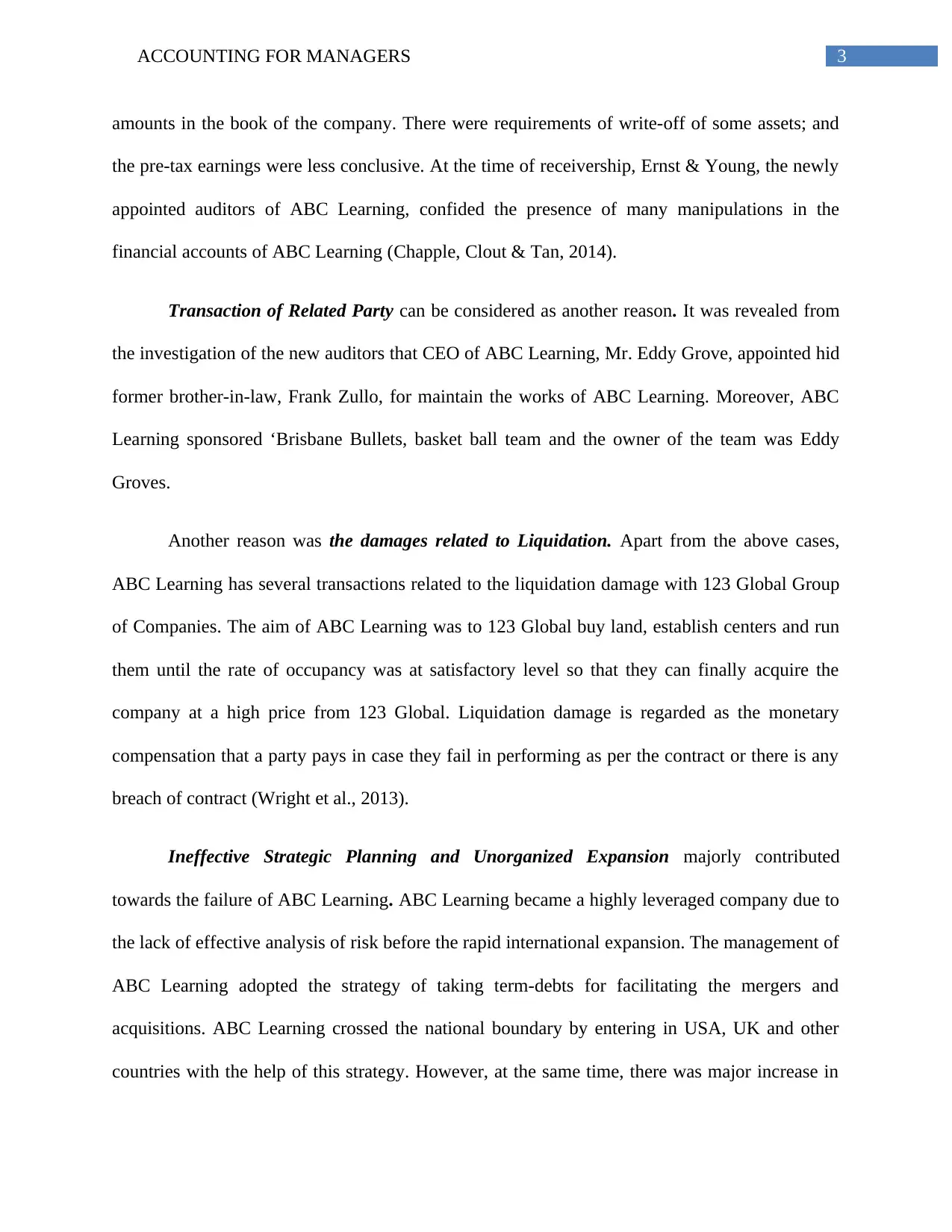
3ACCOUNTING FOR MANAGERS
amounts in the book of the company. There were requirements of write-off of some assets; and
the pre-tax earnings were less conclusive. At the time of receivership, Ernst & Young, the newly
appointed auditors of ABC Learning, confided the presence of many manipulations in the
financial accounts of ABC Learning (Chapple, Clout & Tan, 2014).
Transaction of Related Party can be considered as another reason. It was revealed from
the investigation of the new auditors that CEO of ABC Learning, Mr. Eddy Grove, appointed hid
former brother-in-law, Frank Zullo, for maintain the works of ABC Learning. Moreover, ABC
Learning sponsored ‘Brisbane Bullets, basket ball team and the owner of the team was Eddy
Groves.
Another reason was the damages related to Liquidation. Apart from the above cases,
ABC Learning has several transactions related to the liquidation damage with 123 Global Group
of Companies. The aim of ABC Learning was to 123 Global buy land, establish centers and run
them until the rate of occupancy was at satisfactory level so that they can finally acquire the
company at a high price from 123 Global. Liquidation damage is regarded as the monetary
compensation that a party pays in case they fail in performing as per the contract or there is any
breach of contract (Wright et al., 2013).
Ineffective Strategic Planning and Unorganized Expansion majorly contributed
towards the failure of ABC Learning. ABC Learning became a highly leveraged company due to
the lack of effective analysis of risk before the rapid international expansion. The management of
ABC Learning adopted the strategy of taking term-debts for facilitating the mergers and
acquisitions. ABC Learning crossed the national boundary by entering in USA, UK and other
countries with the help of this strategy. However, at the same time, there was major increase in
amounts in the book of the company. There were requirements of write-off of some assets; and
the pre-tax earnings were less conclusive. At the time of receivership, Ernst & Young, the newly
appointed auditors of ABC Learning, confided the presence of many manipulations in the
financial accounts of ABC Learning (Chapple, Clout & Tan, 2014).
Transaction of Related Party can be considered as another reason. It was revealed from
the investigation of the new auditors that CEO of ABC Learning, Mr. Eddy Grove, appointed hid
former brother-in-law, Frank Zullo, for maintain the works of ABC Learning. Moreover, ABC
Learning sponsored ‘Brisbane Bullets, basket ball team and the owner of the team was Eddy
Groves.
Another reason was the damages related to Liquidation. Apart from the above cases,
ABC Learning has several transactions related to the liquidation damage with 123 Global Group
of Companies. The aim of ABC Learning was to 123 Global buy land, establish centers and run
them until the rate of occupancy was at satisfactory level so that they can finally acquire the
company at a high price from 123 Global. Liquidation damage is regarded as the monetary
compensation that a party pays in case they fail in performing as per the contract or there is any
breach of contract (Wright et al., 2013).
Ineffective Strategic Planning and Unorganized Expansion majorly contributed
towards the failure of ABC Learning. ABC Learning became a highly leveraged company due to
the lack of effective analysis of risk before the rapid international expansion. The management of
ABC Learning adopted the strategy of taking term-debts for facilitating the mergers and
acquisitions. ABC Learning crossed the national boundary by entering in USA, UK and other
countries with the help of this strategy. However, at the same time, there was major increase in
Paraphrase This Document
Need a fresh take? Get an instant paraphrase of this document with our AI Paraphraser
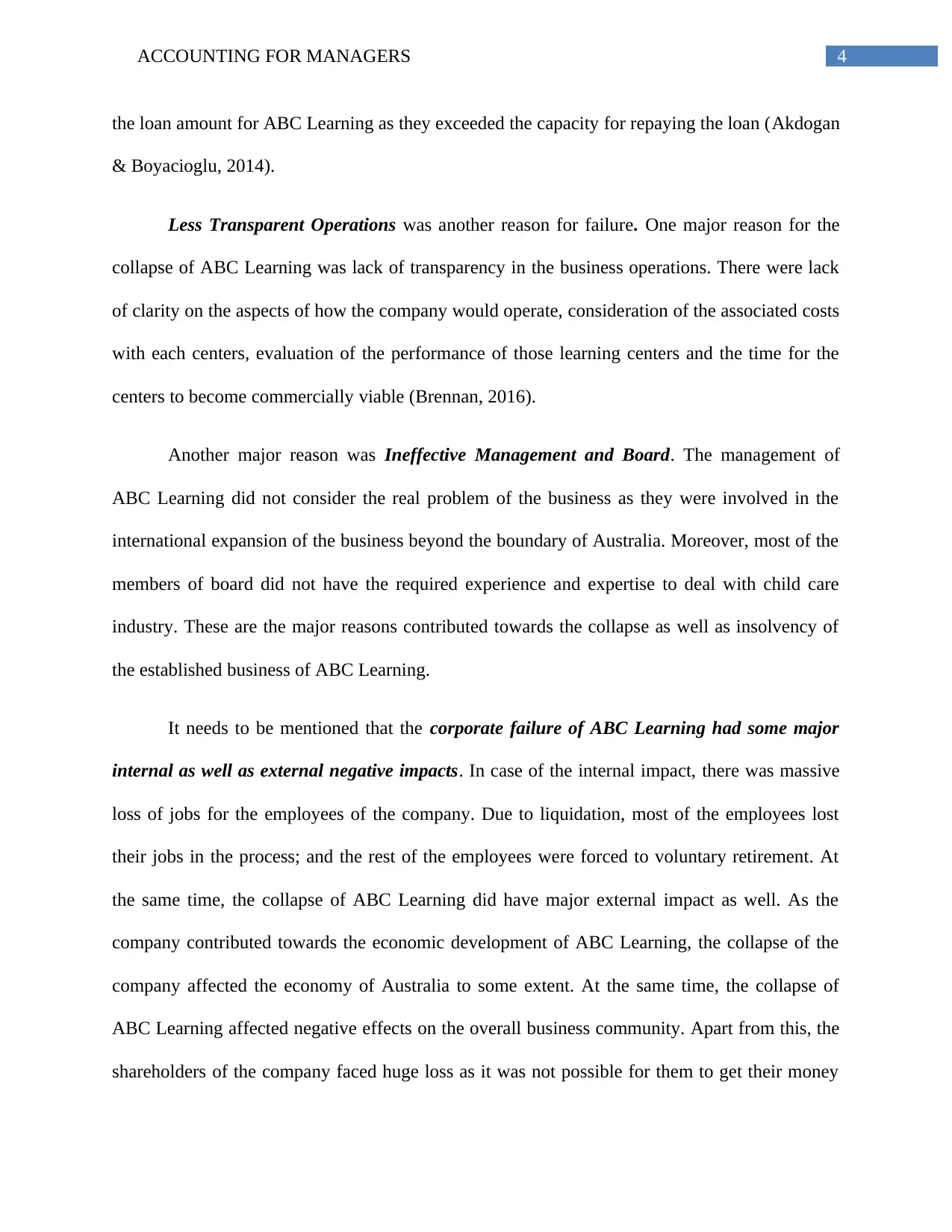
4ACCOUNTING FOR MANAGERS
the loan amount for ABC Learning as they exceeded the capacity for repaying the loan (Akdogan
& Boyacioglu, 2014).
Less Transparent Operations was another reason for failure. One major reason for the
collapse of ABC Learning was lack of transparency in the business operations. There were lack
of clarity on the aspects of how the company would operate, consideration of the associated costs
with each centers, evaluation of the performance of those learning centers and the time for the
centers to become commercially viable (Brennan, 2016).
Another major reason was Ineffective Management and Board. The management of
ABC Learning did not consider the real problem of the business as they were involved in the
international expansion of the business beyond the boundary of Australia. Moreover, most of the
members of board did not have the required experience and expertise to deal with child care
industry. These are the major reasons contributed towards the collapse as well as insolvency of
the established business of ABC Learning.
It needs to be mentioned that the corporate failure of ABC Learning had some major
internal as well as external negative impacts. In case of the internal impact, there was massive
loss of jobs for the employees of the company. Due to liquidation, most of the employees lost
their jobs in the process; and the rest of the employees were forced to voluntary retirement. At
the same time, the collapse of ABC Learning did have major external impact as well. As the
company contributed towards the economic development of ABC Learning, the collapse of the
company affected the economy of Australia to some extent. At the same time, the collapse of
ABC Learning affected negative effects on the overall business community. Apart from this, the
shareholders of the company faced huge loss as it was not possible for them to get their money
the loan amount for ABC Learning as they exceeded the capacity for repaying the loan (Akdogan
& Boyacioglu, 2014).
Less Transparent Operations was another reason for failure. One major reason for the
collapse of ABC Learning was lack of transparency in the business operations. There were lack
of clarity on the aspects of how the company would operate, consideration of the associated costs
with each centers, evaluation of the performance of those learning centers and the time for the
centers to become commercially viable (Brennan, 2016).
Another major reason was Ineffective Management and Board. The management of
ABC Learning did not consider the real problem of the business as they were involved in the
international expansion of the business beyond the boundary of Australia. Moreover, most of the
members of board did not have the required experience and expertise to deal with child care
industry. These are the major reasons contributed towards the collapse as well as insolvency of
the established business of ABC Learning.
It needs to be mentioned that the corporate failure of ABC Learning had some major
internal as well as external negative impacts. In case of the internal impact, there was massive
loss of jobs for the employees of the company. Due to liquidation, most of the employees lost
their jobs in the process; and the rest of the employees were forced to voluntary retirement. At
the same time, the collapse of ABC Learning did have major external impact as well. As the
company contributed towards the economic development of ABC Learning, the collapse of the
company affected the economy of Australia to some extent. At the same time, the collapse of
ABC Learning affected negative effects on the overall business community. Apart from this, the
shareholders of the company faced huge loss as it was not possible for them to get their money
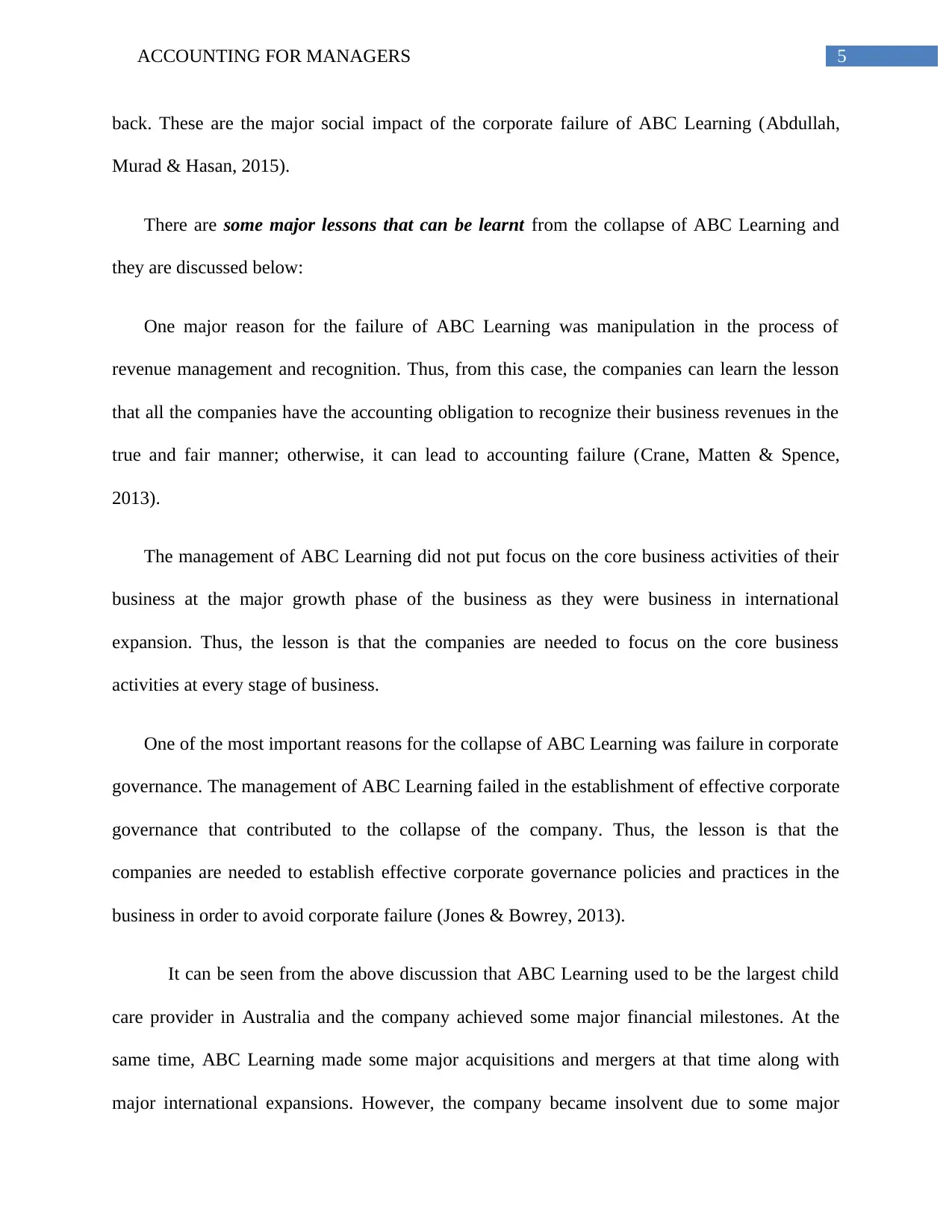
5ACCOUNTING FOR MANAGERS
back. These are the major social impact of the corporate failure of ABC Learning (Abdullah,
Murad & Hasan, 2015).
There are some major lessons that can be learnt from the collapse of ABC Learning and
they are discussed below:
One major reason for the failure of ABC Learning was manipulation in the process of
revenue management and recognition. Thus, from this case, the companies can learn the lesson
that all the companies have the accounting obligation to recognize their business revenues in the
true and fair manner; otherwise, it can lead to accounting failure (Crane, Matten & Spence,
2013).
The management of ABC Learning did not put focus on the core business activities of their
business at the major growth phase of the business as they were business in international
expansion. Thus, the lesson is that the companies are needed to focus on the core business
activities at every stage of business.
One of the most important reasons for the collapse of ABC Learning was failure in corporate
governance. The management of ABC Learning failed in the establishment of effective corporate
governance that contributed to the collapse of the company. Thus, the lesson is that the
companies are needed to establish effective corporate governance policies and practices in the
business in order to avoid corporate failure (Jones & Bowrey, 2013).
It can be seen from the above discussion that ABC Learning used to be the largest child
care provider in Australia and the company achieved some major financial milestones. At the
same time, ABC Learning made some major acquisitions and mergers at that time along with
major international expansions. However, the company became insolvent due to some major
back. These are the major social impact of the corporate failure of ABC Learning (Abdullah,
Murad & Hasan, 2015).
There are some major lessons that can be learnt from the collapse of ABC Learning and
they are discussed below:
One major reason for the failure of ABC Learning was manipulation in the process of
revenue management and recognition. Thus, from this case, the companies can learn the lesson
that all the companies have the accounting obligation to recognize their business revenues in the
true and fair manner; otherwise, it can lead to accounting failure (Crane, Matten & Spence,
2013).
The management of ABC Learning did not put focus on the core business activities of their
business at the major growth phase of the business as they were business in international
expansion. Thus, the lesson is that the companies are needed to focus on the core business
activities at every stage of business.
One of the most important reasons for the collapse of ABC Learning was failure in corporate
governance. The management of ABC Learning failed in the establishment of effective corporate
governance that contributed to the collapse of the company. Thus, the lesson is that the
companies are needed to establish effective corporate governance policies and practices in the
business in order to avoid corporate failure (Jones & Bowrey, 2013).
It can be seen from the above discussion that ABC Learning used to be the largest child
care provider in Australia and the company achieved some major financial milestones. At the
same time, ABC Learning made some major acquisitions and mergers at that time along with
major international expansions. However, the company became insolvent due to some major
⊘ This is a preview!⊘
Do you want full access?
Subscribe today to unlock all pages.

Trusted by 1+ million students worldwide
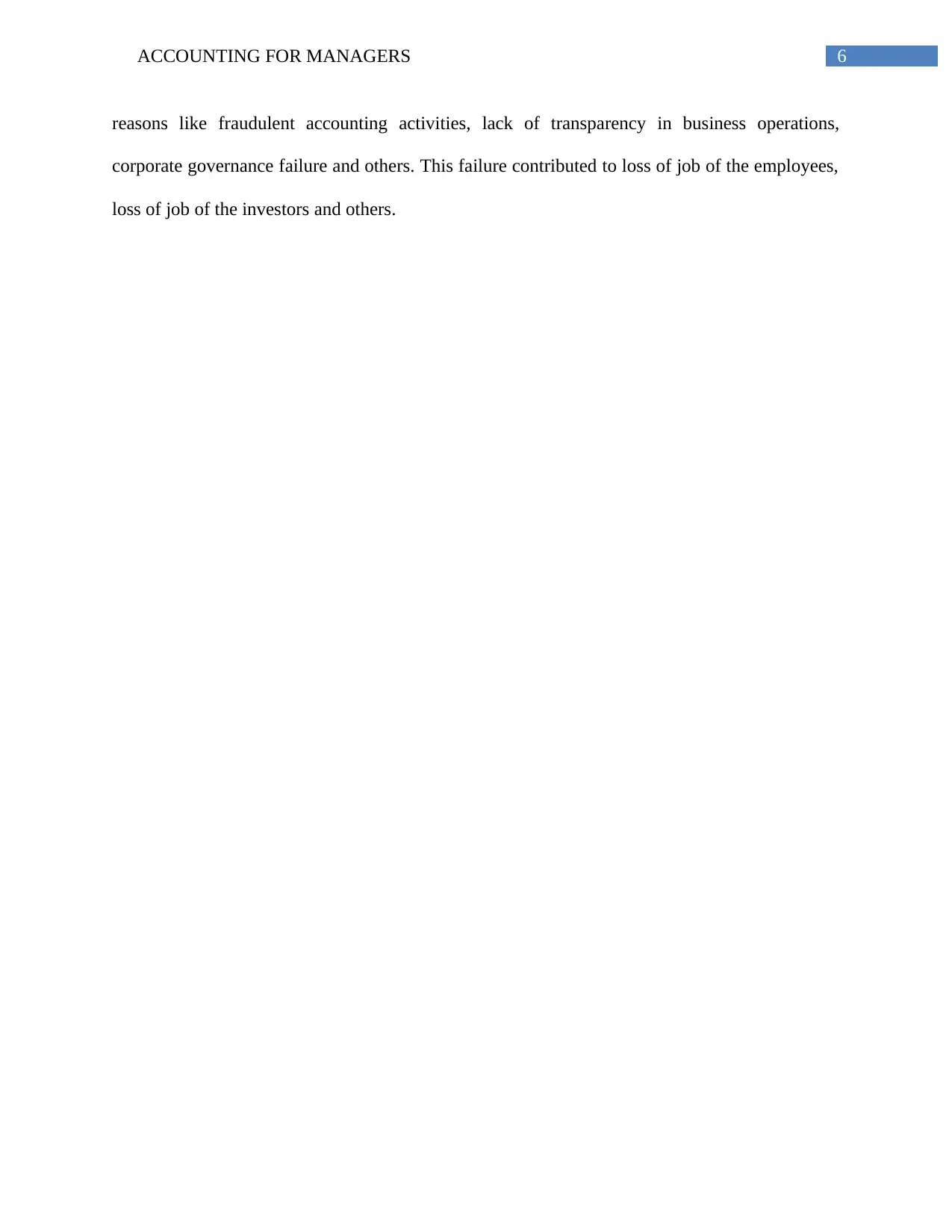
6ACCOUNTING FOR MANAGERS
reasons like fraudulent accounting activities, lack of transparency in business operations,
corporate governance failure and others. This failure contributed to loss of job of the employees,
loss of job of the investors and others.
reasons like fraudulent accounting activities, lack of transparency in business operations,
corporate governance failure and others. This failure contributed to loss of job of the employees,
loss of job of the investors and others.
Paraphrase This Document
Need a fresh take? Get an instant paraphrase of this document with our AI Paraphraser
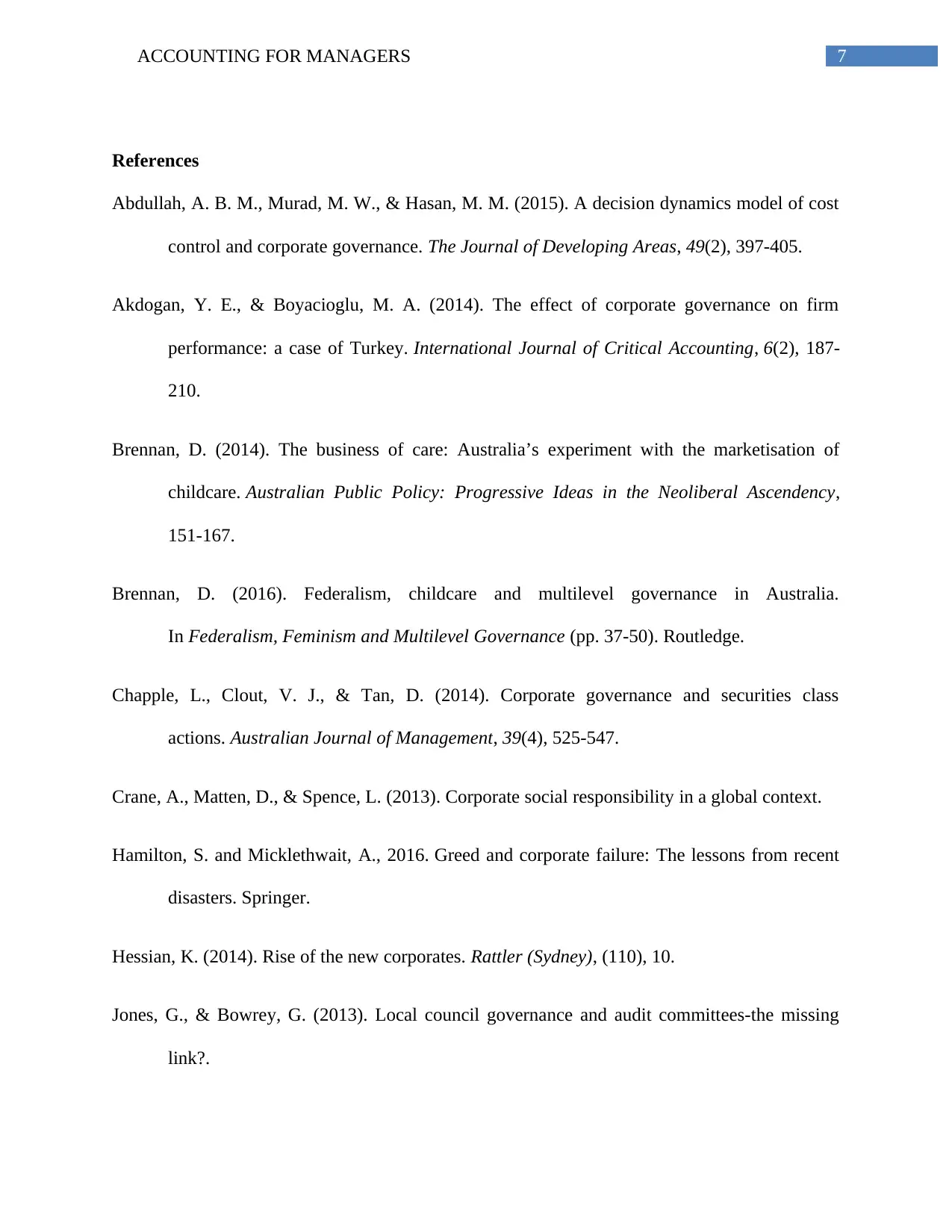
7ACCOUNTING FOR MANAGERS
References
Abdullah, A. B. M., Murad, M. W., & Hasan, M. M. (2015). A decision dynamics model of cost
control and corporate governance. The Journal of Developing Areas, 49(2), 397-405.
Akdogan, Y. E., & Boyacioglu, M. A. (2014). The effect of corporate governance on firm
performance: a case of Turkey. International Journal of Critical Accounting, 6(2), 187-
210.
Brennan, D. (2014). The business of care: Australia’s experiment with the marketisation of
childcare. Australian Public Policy: Progressive Ideas in the Neoliberal Ascendency,
151-167.
Brennan, D. (2016). Federalism, childcare and multilevel governance in Australia.
In Federalism, Feminism and Multilevel Governance (pp. 37-50). Routledge.
Chapple, L., Clout, V. J., & Tan, D. (2014). Corporate governance and securities class
actions. Australian Journal of Management, 39(4), 525-547.
Crane, A., Matten, D., & Spence, L. (2013). Corporate social responsibility in a global context.
Hamilton, S. and Micklethwait, A., 2016. Greed and corporate failure: The lessons from recent
disasters. Springer.
Hessian, K. (2014). Rise of the new corporates. Rattler (Sydney), (110), 10.
Jones, G., & Bowrey, G. (2013). Local council governance and audit committees-the missing
link?.
References
Abdullah, A. B. M., Murad, M. W., & Hasan, M. M. (2015). A decision dynamics model of cost
control and corporate governance. The Journal of Developing Areas, 49(2), 397-405.
Akdogan, Y. E., & Boyacioglu, M. A. (2014). The effect of corporate governance on firm
performance: a case of Turkey. International Journal of Critical Accounting, 6(2), 187-
210.
Brennan, D. (2014). The business of care: Australia’s experiment with the marketisation of
childcare. Australian Public Policy: Progressive Ideas in the Neoliberal Ascendency,
151-167.
Brennan, D. (2016). Federalism, childcare and multilevel governance in Australia.
In Federalism, Feminism and Multilevel Governance (pp. 37-50). Routledge.
Chapple, L., Clout, V. J., & Tan, D. (2014). Corporate governance and securities class
actions. Australian Journal of Management, 39(4), 525-547.
Crane, A., Matten, D., & Spence, L. (2013). Corporate social responsibility in a global context.
Hamilton, S. and Micklethwait, A., 2016. Greed and corporate failure: The lessons from recent
disasters. Springer.
Hessian, K. (2014). Rise of the new corporates. Rattler (Sydney), (110), 10.
Jones, G., & Bowrey, G. (2013). Local council governance and audit committees-the missing
link?.
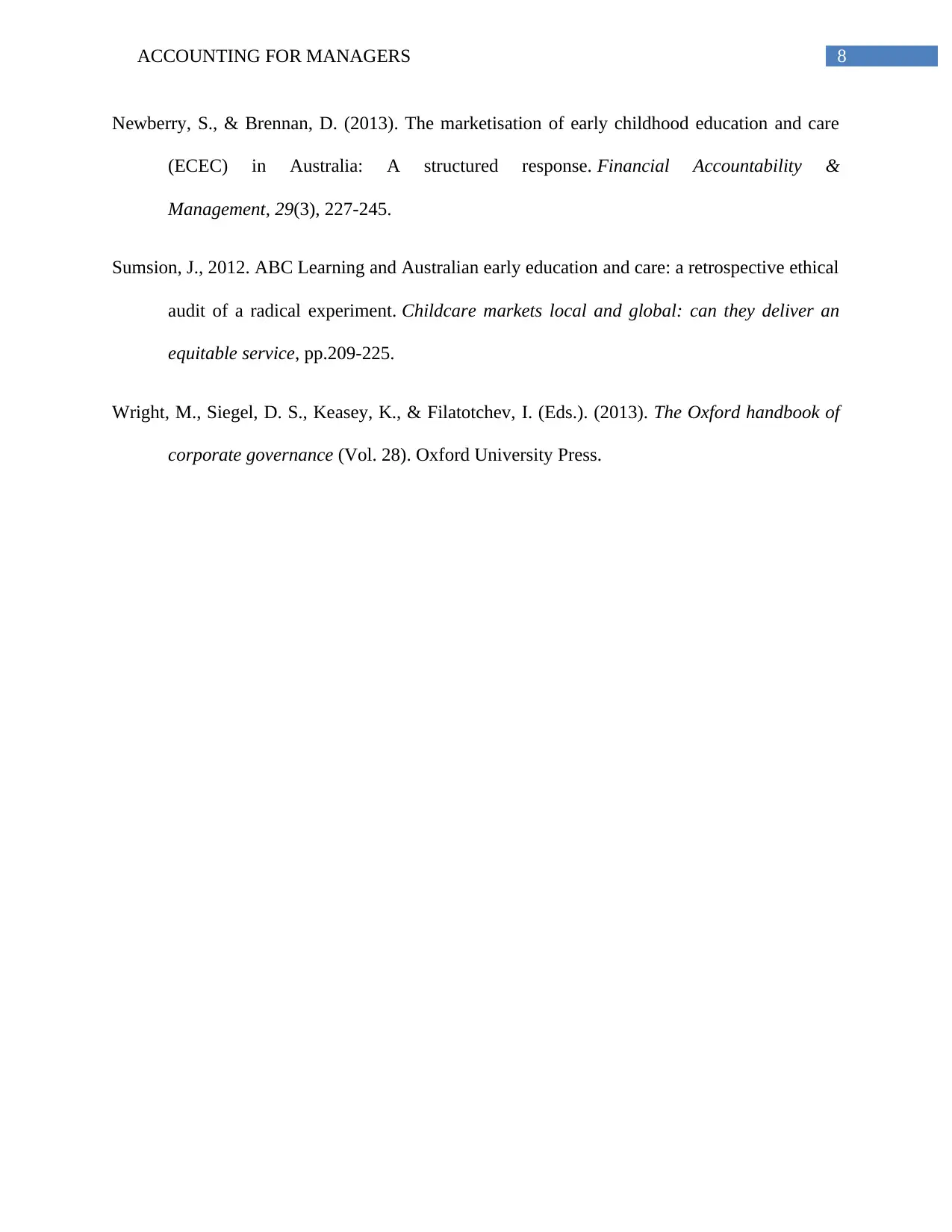
8ACCOUNTING FOR MANAGERS
Newberry, S., & Brennan, D. (2013). The marketisation of early childhood education and care
(ECEC) in Australia: A structured response. Financial Accountability &
Management, 29(3), 227-245.
Sumsion, J., 2012. ABC Learning and Australian early education and care: a retrospective ethical
audit of a radical experiment. Childcare markets local and global: can they deliver an
equitable service, pp.209-225.
Wright, M., Siegel, D. S., Keasey, K., & Filatotchev, I. (Eds.). (2013). The Oxford handbook of
corporate governance (Vol. 28). Oxford University Press.
Newberry, S., & Brennan, D. (2013). The marketisation of early childhood education and care
(ECEC) in Australia: A structured response. Financial Accountability &
Management, 29(3), 227-245.
Sumsion, J., 2012. ABC Learning and Australian early education and care: a retrospective ethical
audit of a radical experiment. Childcare markets local and global: can they deliver an
equitable service, pp.209-225.
Wright, M., Siegel, D. S., Keasey, K., & Filatotchev, I. (Eds.). (2013). The Oxford handbook of
corporate governance (Vol. 28). Oxford University Press.
⊘ This is a preview!⊘
Do you want full access?
Subscribe today to unlock all pages.

Trusted by 1+ million students worldwide
1 out of 9
Related Documents
Your All-in-One AI-Powered Toolkit for Academic Success.
+13062052269
info@desklib.com
Available 24*7 on WhatsApp / Email
![[object Object]](/_next/static/media/star-bottom.7253800d.svg)
Unlock your academic potential
Copyright © 2020–2026 A2Z Services. All Rights Reserved. Developed and managed by ZUCOL.





